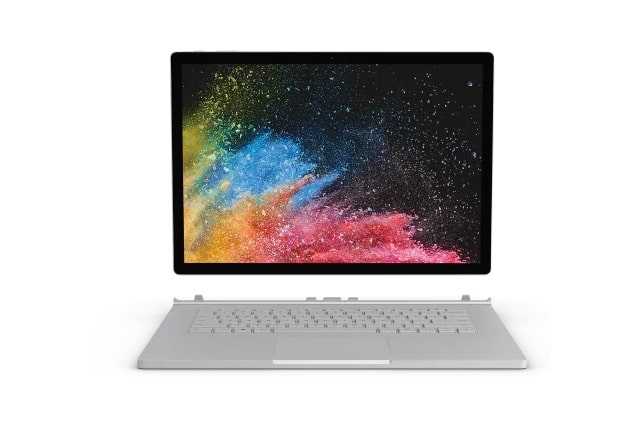
Microsoft stops selling ebooks, offers refunds to customers
If you have been using the Microsoft Store as your point of purchase for ebooks, you're going to have to start shopping elsewhere. Microsoft has ditched the Books category from the store, and this means that not only will it not be possible to buy books from the Microsoft Store, but also that previous purchases will not be accessible after July.
For anyone who has built up a library of ebooks via Microsoft, this will come as bad news -- but there is a slight silver lining. The company says that it will provide full refunds for all book purchases.

Logitech announces SLIM FOLIO PRO for third generation Apple iPad Pro
Ever since the release of the first-ever iPad in 2010, people have been trying to convert Apple's tablet into a laptop with add-on keyboards. You know what? It actually isn't too bad. True, lack of mouse/trackpad support in iOS can turn this makeshift laptop configuration into a frustrating experience, but in some situations, it is totally passable. If you are a writer, for instance, an iPad with a keyboard can remove distractions and focus your attention. If you do hardcore multitasking, however, a traditional laptop with Windows, macOS, Chrome OS, or Ubuntu is probably a wiser choice.
If you are OK with the limitations of iOS, and you still think an iPad or iPad Pro would be your ideal portable computer, than you should definitely check out Logitech keyboard cases. The company's iPad keyboard offerings have been consistently excellent and should last a long time. Now, Logitech is back again with a new keyboard case. Called "SLIM FOLIO PRO," it is designed for use with the third generation iPad Pro. And yes, both the 11- and 12.9-inch variants are supported -- there is a model for each.

Financial sector concerned about third-party cyber risk
Many organizations work with hundreds of third parties, creating new risks that must be actively managed. The financial industry, in particular, has a massive business ecosystem made up of legal organizations, accounting and human resources firms, management consulting and outsourcing firms, and information technology and software providers.
A new study into the financial services sector from security ratings company BitSight finds that 97 percent of respondents say cyber risk affecting third parties is a major issue.

Email app Spark arrives on Android ready to replace Google Inbox
Google may be shutting down its Inbox app later this week, but there are alternatives out there. In fact, the number of options available to Android users just increased.
Spark -- which has proved very popular with iOS and macOS users -- has just migrated to Android, bringing with it all manner of inbox organizing smarts. Developer Readdle says it will, "make you love email again".

Fedora 30 Beta is here -- try the next version of the best Linux distro now
Fedora is the best overall Linux distribution. It's really not up for debate -- even the father of Linux, Linus Torvalds uses it. The focus of the operating system is truly free and open source software, making it one of the most pure experiences. And while there are many flavors to choose with various desktop environments, the default is GNOME -- the overall best DE. While Fedora maybe isn't the best distro for beginners, it should be the eventual choice for those that "level up" to being an experienced Linux user later.
Today, after a bit of a delay, Fedora 30 is finally available for download. Details are a bit sparse regarding new features, but we will add them as we know more. What we do know, however, is the Workstation variant (which is what most users care about) uses GNOME 3.32 -- the latest and greatest version of that desktop environment.

Companies overconfident in management of sensitive data
A new study into how enterprises manage sensitive data reveals overconfidence in knowing where private data resides, and the use of inadequate tools such as spreadsheets to track it.
The research from Integris Software shows 40 percent are 'very' or 'extremely' confident in knowing exactly where sensitive data resides, despite only taking inventory once a year or less. Yet a mere 17 percent of respondents are able to access sensitive data across five common data source types.

Taxpayers worry about online fraud but offline habits could be putting them at risk
As we approach the tax return season, a survey from document destruction and information security company Shred-It reveals that 38 percent of US taxpayers say they are worried they will become a victim of tax fraud or tax identity theft.
Yet according to the study 45 percent admit to storing tax paperwork in a box, desk drawer or unlocked cabinet at home or work. What's more, 19 percent admit they don't shred tax paperwork or physical documents containing sensitive information before throwing them away.

Microsoft launches new 13.5-inch Surface Book 2 with 8th Gen Intel quad-core i5 processor
With precisely zero fanfare, Microsoft has added a new mid-range Surface Book 2 to the existing line-up. Priced at $1,499, the 13.5-inch model is now available with the new i5-8350U processor.
The addition of an 8th generation Intel quad-core Core i5 processor was something we'd heard rumoured, and this new model not only opens up the range of options available to buyers, it also means that other prices have been reduced.

85 percent of organizations don't meet basic levels of PAM security
While 78 percent of organizations now include privileged credential protection as part of their cyber security policies, their privileged access management (PAM) security practices are still lacking.
According to a new study by PAM specialist Thycotic, 85 percent of respondents are still struggling to get beyond the initial phase of PAM maturity.

FinalCrypt 4.0.3 adds uncrackable encryption to your most sensitive files
The battle to encrypt data securely rages on, with developments in quantum computing mirrored by hackers’ ever more creative attempts to break encryption. Ironically, one form of encryption resistant to all forms of hacking -- One Time Pad (OTP) -- dates from the 19th century.
Symmetric OTP works by generating encryption from a key file -- the larger the better -- which renders all attempts to decrypt the data useless without access to said key file. And FinalCrypt, available for Windows, Mac and Linux -- indeed any Java-capable computer can run the tool, brings the technology to any computer user.

Cloudflare announces free VPN service, Warp, to complement its 1.1.1.1 DNS resolver
Online privacy has become such a concern that VPN tools -- once used only by technology experts -- have now started to become far more mainstream. Android users can take advantage of Opera's built-in VPN, and there are many other services to choose from.
Adding to this list, Cloudflare has announced a new free VPN service called Warp. It will become part of the company's existing privacy-focused 1.1.1.1 DNS resolver, and just as 1.1.1.1 was designed to simplify using a DNS tool, so Warp is being billed as a "VPN for people who don't know what V.P.N. stands for".

Attackers target supply chains using 'island hopping'
Around half of recent cyberattacks use 'island hopping' techniques, seeking to target not just one network but those along the supply chain too.
This is one of the findings of the latest Global Incident Response Threat Report from Carbon Black. It also finds that 70 percent of attacks now attempt to move laterally around the network.

How to schedule emails in Gmail
It seems hard to believe, but Gmail has now been with us for 15 years. To celebrate a decade-and-a-half of existence, Google has added a handful of new and improved features to it.
Smart compose has been updated and expanded to more devices and languages, and it has also been made smarter with AI-powered personalization. But the star of the show is email scheduling, something people have been asking for for years. Here's how to use it.

You can now buy an official Raspberry Pi keyboard and mouse
The beauty of the Raspberry Pi is you don’t need to spend a fortune to get the barebones computer up and running. Once you’ve bought the Pi itself, you can use your own keyboard, mouse, monitor, power supply and so on, and spend as little (or as much) as you want to get any items you require but don’t currently have.
Raspberry Pi owners have been able to buy official Pi cases for a while, and now they can add an official keyboard and mouse too, so everything matches.

Vulnerabilities leave financial mobile apps open to attack
A new report reveals widespread security inadequacies and protection failures among consumer financial applications.
The research for Arxan Technologies, carried out by Aite Group, says these vulnerabilities can lead to the exposure of source code, sensitive data stored in apps, access to back-end servers via APIs, and more.



